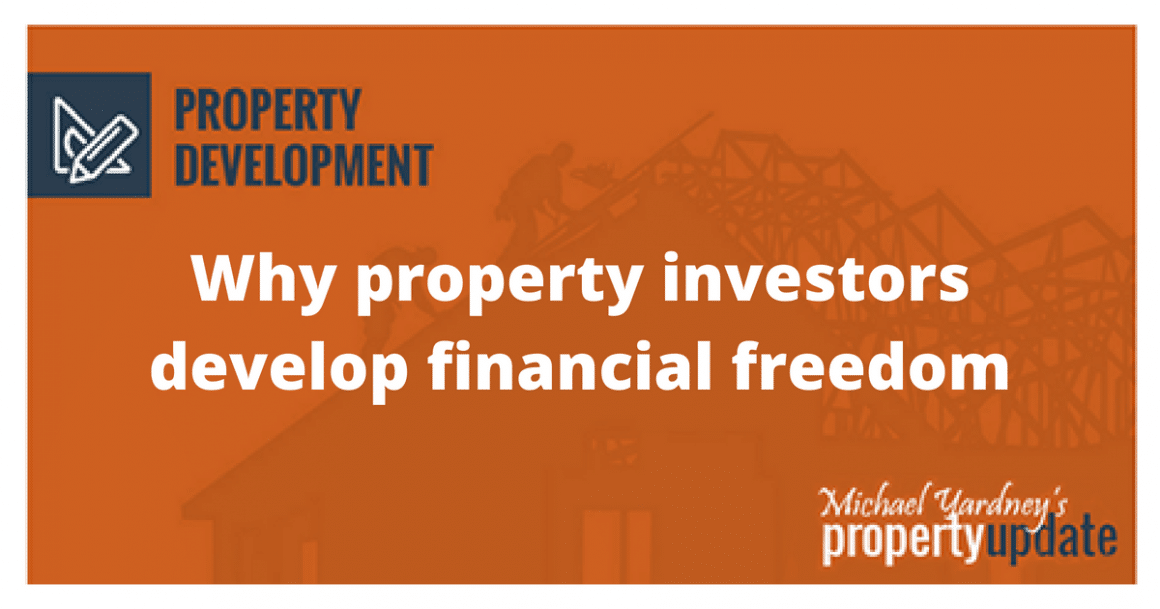We dream of it, we work for it, and sometimes we even plan for it – but can the average Australian really develop financial independence?
The simple answer is YES – because if others have achieved it so can you. 
I’ll let you in on a little secret… wealthy people don’t do different things; they just do things in a different way – from the way they think to the actions they take.
This means you can also become wealthy by doing what they do and thinking how they think.
For example… not everybody has to work hard for their money.
That’s because the rich earn recurring passive income. Being a property investor or a business owner is like owning the proverbial money tree – you control something that makes money for you, without the need to even be there.
Being a property investor or a business owner is like owning the proverbial money tree – you control something that makes money for you, without the need to even be there.
In his Rich Dad, Poor Dad series of books, Robert Kiyosaki explains how the rich differ from the poor.
It’s not just because they have more money.
The main difference is how they think about and interact with their money and that when it comes to how people make money, we can all be placed in one of four categories.
1. The Employed – have a job
googletag.cmd.push(function() { googletag.display(‘div-gpt-ad-1599568850982-0’); });
Employees trade hours for dollars; however what they really get are leftovers – after the government takes its share in taxes.
“So what? They do that to everyone!” you may be thinking.
Well no, they don’t.
Business owners and investors only pay tax on what’s left over after their bills are paid.
Wouldn’t it be nice to only have to pay tax on what you don’t spend?
2. The Self-Employed – own a job
Self-employed people and professionals usually want to be their own boss.
They’re prepared to work hard, but often what they’ve done is swap one boss for hundreds of bosses – customers or clients.
In reality, self-employed people aren’t business owners – they still work for their money, but they’re somewhat better off than employed people because if they’re able to take advantage of tax deductions that allow them to pay their business expenses before being taxed on what’s left over.
3. The Business Owner – owns a system and people work for them
The true business owner not only doesn’t have to work, he doesn’t have to be at work every day, because he has a system and people to do it all for him, and possibly even supervisors to manage his workers.
The true business owner asks, “Why do it yourself when you can employ someone to do it for you?”
After initially investing in a business idea, and a business system, they let the money they have invested – which is now in the form of a business – work for them.
4. The Investor – money works for them
Investors don’t have to work either, because their money works for them.
If you hope to become rich at some point, you have to belong to this group; because investors convert money into wealth.
Obviously, you’re not going to jump from being an employee to a full time investor overnight. 
But you can start taking the steps to move from being an employee or self employed, by building your own property portfolio.
Done correctly, income earning residential real estate can be your vehicle for getting out of the rat race!
There are also many legal tax advantages available to investors.
One of the reasons the rich get richer is that in some cases, they make millions and legally pay very little tax.
That’s because they build their assets, not their income and make their money as investors, not workers.
Imagine you own investment properties worth $1 million that increase in value by 8% each year.
In twelve months your asset base will have increased by $80,000, yet no tax is payable on this.
Wealthy property investors can borrow against the increased value of their assets and use the money to reinvest or live off.
Where do you stand?
Which category do you fit in?
Are you an employee, self employed, a business owner or an investor?
In the past there has been a slow but steady transfer of wealth from employees and self employed to business owners and investors.
They’re all playing the same game, but each group is playing with a different set of rules and their mindsets are poles apart.
Employees and self employed work harder and harder, trying to build cashflow, yet many dig themselves deeper into a hole of consumer debt.
In the meantime, business owners and investors slowly build up their assets.
The employed and self-employed pay the most tax, while business owners and investors take advantage of legal tax loopholes.
Logically, if you want to become wealthy you are going to have to become either a business owner or an investor. It’s just too hard to become rich as an employee or self-employed worker.
Does that mean you should give up your day job?
Not necessarily.
Many employees have become very successful investors – in particular property investors.
So rather than relinquish your job, I suggest you start educating yourself with the aim of becoming a property investor – initially in your spare time and then maybe, if you choose, on a full time basis.
Should you become a business owner?
Most small businesses fail in the first 5 years.
In general I think the opportunity to become rich through successful property investment is much easier for the average Australian.
That’s why I recommend you seriously consider making your fortune as an educated, financially fluent real estate investor who treats their property like a business.
WHAT DOES ALL THIS MEAN FOR YOU?
Of course…if you want to grow your property portfolio in the more difficult environment we’re likely to experience this year you’ll need to buy the right type of property.
One that has a level of scarcity, meaning they will be in continuous strong demand by owner-occupiers (to keep pushing up the value) and tenants (to help subsidise your mortgage); in the right location (one that has outperformed the long term averages), at the right time in the property cycle (that would be now in many states) and for the right price.
Now is the time to take action and set yourself for the opportunities that will present themselves as the market moves on

If you’re wondering what will happen to property in 2020–2021 you are not alone.
You can trust the team at Metropole to provide you with direction, guidance and results.
In challenging times like we are currently experiencing you need an advisor who takes a holistic approach to your wealth creation and that’s what you exactly what you get from the multi award winning team at Metropole.
If you’re looking at buying your next home or investment property here’s 4 ways we can help you:
Strategic property advice. – Allow us to build a Strategic Property Plan for you and your family. Planning is bringing the future into the present so you can do something about it now! This will give you direction, results and more certainty. Click here to learn more
Buyer’s agency – As Australia’s most trusted buyers’ agents we’ve been involved in over $3Billion worth of transactions creating wealth for our clients and we can do the same for you. Our on the ground teams in Melbourne, Sydney and Brisbane bring you years of experience and perspective – that’s something money just can’t buy. We’ll help you find your next home or an investment grade property. Click here to learn how we can help you.
Wealth Advisory – We can provide you with strategic tailored financial planning and wealth advice. Click here to learn more about we can help you.
Property Management – Our stress free property management services help you maximise your property returns. Click here to find out why our clients enjoy a vacancy rate considerably below the market average, our tenants stay an average of 3 years and our properties lease 10 days faster than the market average.
googletag.cmd.push(function() { googletag.display(‘div-gpt-ad-1592314976732-0’); });
Read more: propertyupdate.com.au

